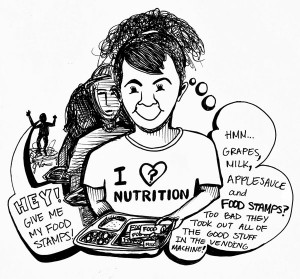Bill is food for thought
With the House of Representatives effectively stalling the Child Nutrition Act a few weeks ago, the controversy over government involvement in children’s eating habits has returned to center stage.
The bill, officially titled the Healthy, Hunger-Free Kids Act, unanimously passed through the Senate in August, but the version presented to the House had a major difference — a portion of the $4.5 billion used to improve the nutrition of school-provided meals would come from $2 billion in cuts to the federal programs that pay for food stamps.
Although initially supported by Democrats in Congress, this amended version was met with criticism from the party.
“It’s just plain wrong … the way you are going to pay for a child nutrition bill is by dipping into people’s food stamps? Give me a break,” said Rep. Jim McGovern (D-Mass.) in an interview with The Huffington Post.
McGovern, who has advocated for child nutrition bills in the past, is not alone — many Democratic representatives have voiced similar opinions about the bill.
Their argument, of course, is that it is wrong to take away food stamps from recipients, especially in the present economic conditions. Realizing that this bill could easily lead to a drop in popularity among voters, Democratic leaders decided to postpone a vote on the bill after the upcoming midterm elections — which are crucial for democrats.
Anti-hunger groups and 106 Democratic Representatives even wrote a letter to House Majority Leader Nancy Pelosi (D-Calif.) to express their disapproval of the bill, according to The Washington Post.
If passed, the bill would authorize the government to spend $4.5 billion on school meals over 10 years — the first increase since 1973. The bill would also improve school nutrition standards — a major tenet of First Lady Michelle Obama’s “Let’s Move” campaign to combat child obesity. Obama has advocated strongly on behalf of the bill.
Democratic representatives made the right move in postponing the vote on this bill. Not only would it have been politically disastrous, but the idea of taking funding away from a group in dire need is neither fair nor morally sound. Still, that does not mean the idea of government oversight in school nutrition is wrong.
Though the bill has been tabled, the controversy over how much jurisdiction should be allowed in school nutrition is more heated than ever.
Critics claim the government is overstepping its bounds by telling young students what they can and cannot eat — a job that many feel belongs to parents, not legislators.
Therefore, any legislation that deals with restricting certain foods in schools is dangerous, and many worry that this could be a gateway for further federal oversight that will involve not just food, but academic content as well.
Unhealthy eating in schools creates a pattern for students that can continue well into college and adulthood, and lead to more serious health issues later in life. If the government steps in to curtail unhealthy eating habits early on, it is more likely those affected will avoid obesity and heart complications as adults.
Despite what critics say about parents losing the freedom to feed their kids any type of food, it is of utmost importance that the government does all it can to help curb childhood obesity — even if that means extending its hand into the school system.
Many parents are unwilling or unable to help their children eat healthy, or perhaps lack the proper understanding of childhood nutrition to make the healthy choices. Some families living in lower-income neighborhoods have often said that grocery stores carrying fresh fruits and vegetables are too far away from their homes or maintain price tags that are too unrealistic. With government intervention in nutrition, children living in such areas would be able to eat at least one healthy meal a day.
Preventing the government from playing a role in school nutrition hurts efforts against childhood obesity, and the health of young students at large. Although the current bill needs to be funded through an alternative source, the content and intention of the bill is spot on.
Angad Singh is a junior majoring in international relations and communication.


Just for the record, Nancy Pelosi is not House Majority Leader (Steny Hoyer is). Pelosi is Speaker of the House.
Sorry, America. There is no Santa Claus. When gov’t gives something for free, it’s not really free.
Hey Angad — if the government stopped taxing the hell out of people and strangling business with regulation, then there would be more JOBS and more people could afford those expensive fresh fruits and vegetables.
BONUS: The government wouldn’t have to play “mommy” to tell us what to eat!
The sheer arrogance of a comment like this: “Many parents are unable or unwilling to help their children eat healthy” (by the way Angad it’s “healthfully” when used in that context) — anyway, the arrogance astounds me. “Many parents”? Really? I love the way he moves right to “low-income” families next, to clarify the elite arrogance that those dumb poor people really don’t understand that an all-Twinkie diet is bad! WE MUST HELP THEM.
This bill is the opposite of spot on. And even if it were the right thing, which it is not, we can’t afford it no matter WHERE the funding comes from. Our government is broke. The last thing we should be doing is throwing money at a problem that we have no business sticking our nose in.